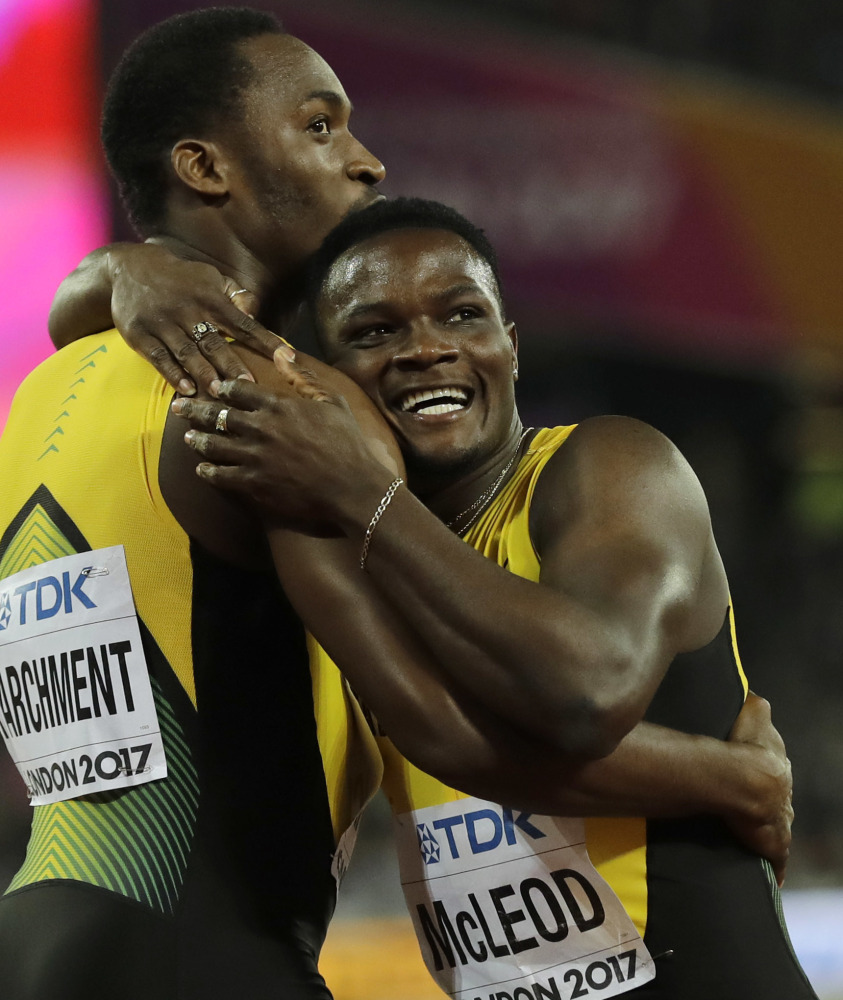LONDON — The tune blaring across the stadium sound system was unmistakable: “Jamming” by Bob Marley. The flag the winner paraded around the track was familiar, too: The black, green and gold cross of Jamaica.
That 110-meter hurdler Omar McLeod was at the center of this celebration Monday wasn’t all that big a surprise. That McLeod was the first from the island to do the honors at this year’s world championships still feels like something of a shock.
The 23-year-old from Kingston did what Usain Bolt and Elaine Thompson could not the previous nights in the 100 meters – namely, powered toward the finish line and left the field behind to bring a gold medal home to a country that has come to expect nothing less.
“I took it upon myself to reroute that and bring that spark back,” said McLeod, who adds this gold medal to his Olympic title from last year. “I’m happy I did that.”
McLeod won in 13.04 seconds, while the world-record holder, American Aries Merritt, finished fifth. It marked the first disappointment of the meet for the U.S. on a straightaway where Justin Gatlin and Tori Bowie won the 100 and Christian Coleman finished second to Gatlin and one spot ahead of Bolt.
The U.S. got shut out of the medals in the 110 hurdles for the first time since the world championships were first contested in 1983. That, plus the unlikely notion of McLeod, not Bolt, breaking the ice at the top of the podium for Jamaica were Exhibits 1 and 1a of why they run the races.
“Everyone in the hurdling game is hurdling well,” said Merritt, who was competing in his first major competition since a kidney transplant after the 2015 worlds.
Other gold medalists Monday were Venezuela’s Yulimar Rojas in the triple jump and Poland’s Anita Wlodarczyk in the hammer throw.
Kenya’s Faith Kipyegon won the 1,500 meters, while Caster Semenya moved from fifth to third over the last 50 meters to capture the bronze.
She was in 10th place in the 12-woman final going into the last lap and fought back to medal behind Faith Kipyegon of Kenya and Jenny Simpson of the United States.
The IAAF is looking to reinstate an overturned ban on Semenya, claiming her higher-than-normal testosterone levels give her an unfair advantage over the other women.
Semenya was wrapping up her race at about the same time news started circulating about a stomach virus that hit several athletes competing in London. Among those afflicted was Isaac Makwala of Botswana, who pulled out of the 200-meter heats earlier in the day and could be compromised for the 400-meter final Tuesday, where he was expected to challenge defending champion Wayde van Niekerk of South Africa.
Asked about the illness, the hurdlers knew nothing of it.
Send questions/comments to the editors.



Success. Please wait for the page to reload. If the page does not reload within 5 seconds, please refresh the page.
Enter your email and password to access comments.
Hi, to comment on stories you must . This profile is in addition to your subscription and website login.
Already have a commenting profile? .
Invalid username/password.
Please check your email to confirm and complete your registration.
Only subscribers are eligible to post comments. Please subscribe or login first for digital access. Here’s why.
Use the form below to reset your password. When you've submitted your account email, we will send an email with a reset code.